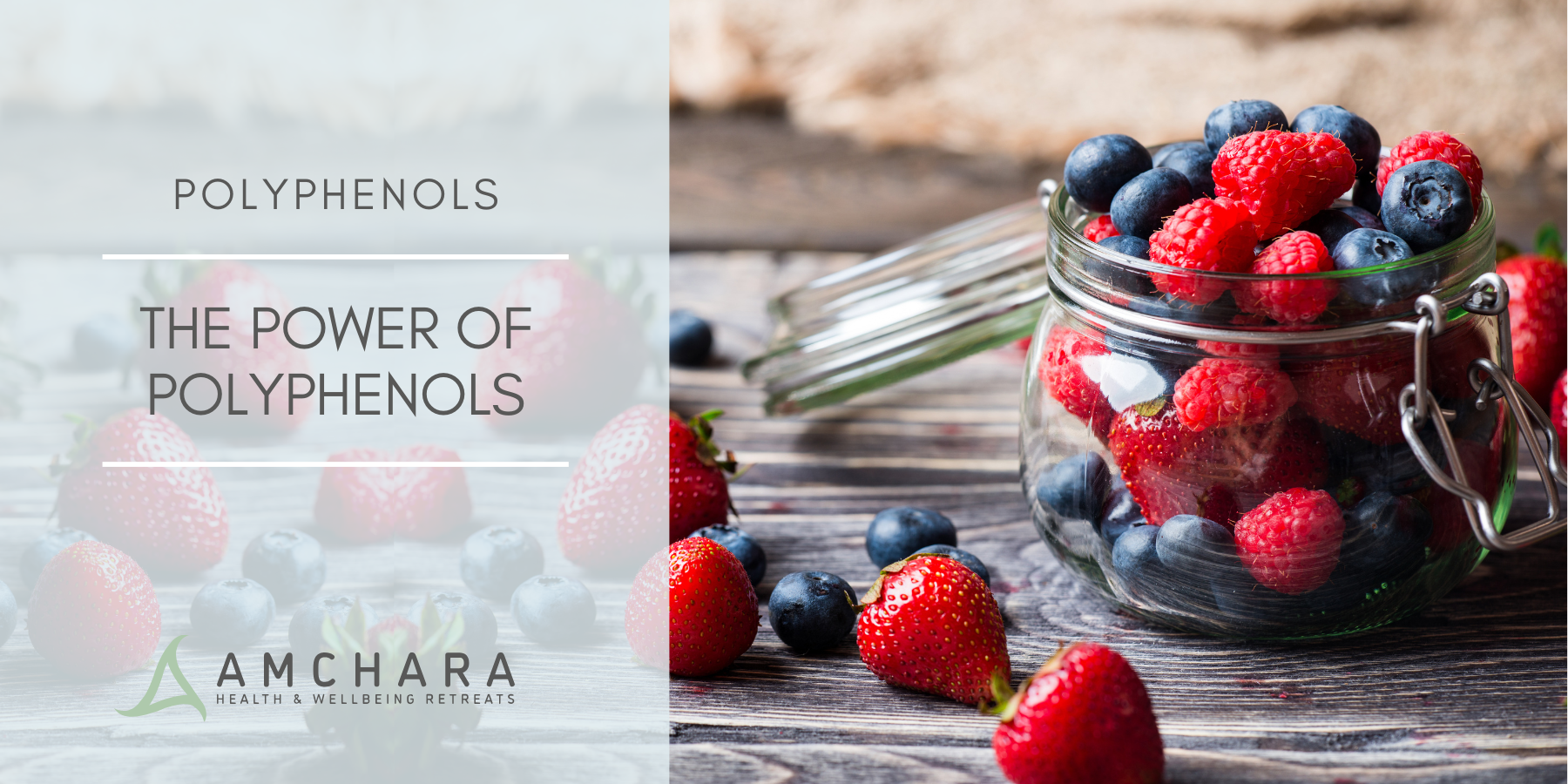Topics Covered in this article:
Polyphenols are naturally occurring bioactive compounds found in plants, celebrated for their potent antioxidant properties, as well as other properties beneficial for health. These bioactive compounds play a crucial role in defending plants against environmental stressors, pests, and UV radiation. There are many different polyphenols and they provide an impressive array of health benefits, contributing to disease prevention and overall wellbeing.
In the modern internet world there is an overwhelming amount of information; it can be hard to find health advice that you can trust, particularly as the main media channels are typically dominated with a single, orthodox narrative.
We always take an evidence-based approach, orientated towards a holistic and Personalised Health approach, and aim to provide you with actionable knowledge and tips to help you on your journey to optimal health.
In this article we will take a look at how polyphenols boost your health, and our top 20 foods which are rich in polyphenols, and how they can help you boost your health, naturally.
How do polyphenols benefit your health?
Polyphenols are powerful plant based chemicals, exerting antioxidant effects, meaning they combat free radicals – unstable molecules that can damage your cells and contribute to ageing and the development of chronic diseases. They also have anti-inflammatory, anti-cancer, and antimicrobial properties. Research suggests that amongst other health benefits, polyphenols can improve heart health, regulate blood sugar levels, enhance gut health, and support brain function.
Top 20 foods rich in polyphenols
- 1
Berries: Blueberries, strawberries and blackberries are packed with anthocyanins, giving them their beautiful, vibrant colours. These antioxidants can reduce inflammation and oxidative stress, and improve cardiovascular health by lowering blood pressure, as well as supporting brain health by stimulating blood flow and oxygen in the brain.
- 2
Green Tea: Polyphenols such as catechins are potent antioxidants linked to reduced risk of heart disease as well as improved brain function. Additionally, aiding fat oxidation can help with weight management.
- 3
Red Wine: Reservatrol is a polyphenol derived from grape skins and can reduce inflammation and improve cholesterol levels, thereby supporting your cardiovascular health. Of course, moderation is key and over-consumption of red wine negates the health benefits.
- 4
Dark Chocolate: Rich in flavonoids, dark chocolate can improve blood flow and lower blood pressure. Combating oxidative stress, these compounds enhance gut health and promote brain function. For maximum benefit, choose chocolate with a minimum of 70% cocoa. As with red wine, moderation is key.
- 5
Olives and Olive Oil: With beneficial polyphenols including hydroxytyrosol and oleuropein, olives and olive oil are anti-inflammatory and heart-protective, helping to protect you against cardiovascular disease.
- 6
Turmeric: The main active polyphenol in turmeric is curcumin which acts as a powerful anti-inflammatory, supporting joint, gut and brain health. Enhance its bioavailability by combining with black pepper.
- 7
Apples: Containing quercetin and catechins, these flavonoids found in apples support immune and respiratory health, with their antihistamine and anti-inflammatory properties.
- 8
Spinach: Quercetin, zeaxanthin and stillbenes are polyphenols known to protect against oxidative stress and support both eye and brain health.
- 9
Broccoli: Kaempferol exerts many potential health benefits acting as anti-inflammatory, anti-cancer, cardioprotective, neuroprotective, antimicrobial and antiallergic.
- 10
Grapes: Resveratrol is another powerful anti-inflammatory, protecting against the development of many chronic diseases, including cardiovascular and cancer. It helps to protect the body’s cells from damage.
- 11
Pomegranate: Ellagitannins and anthocyanin are polyphenols with strong antioxidant properties, working to reduce inflammation and support cardiovascular health.
- 12
Onions: Another excellent source of quercetin, helping to support cardiovascular health, exerting anti-cancer properties, improve insulin sensitivity, and reduce allergy symptoms.
- 13
Citrus Fruits: Fruits such as oranges, lemons, and grapefruits contain polyphenols such as hesperidia and naringenin which are excellent anti-inflammatories and support vascular health.
- 14
Coffee: The many polyphenols in coffee including chlorogenic acids can improve metabolic health, aid in the regulation of blood sugar levels, and protect against the development of chronic health conditions.
- 15
Nuts: Ellagic acid and resveratrol work to reduce inflammation and support cardiovascular health. Nuts can also promote brain health by protecting brain cells from oxidative stress.
- 16
Cherries: Antocyanins work to combat inflammation and can help reduce muscle soreness, promote better quality of sleep, and improve alertness.
- 17
Black and Oolong Teas: Theaflavins and catechins in these teas exert a myriad of benefits including supporting gut health, weight management, and protecting cardiovascular health.
- 18
Beans and Lentils: Containing polyphenols such as flavonoids and tannins, beans and lentils are rich in fibre, and act as prebiotics, helping to improve gut health by reducing inflammation and supporting the digestive system. They may also aid in the reduction of blood pressure.
- 19
Cinnamon: Cinnamaldehyde and proanthocyanidins support digestion, and can aid in the reduction of cholesterol as well as helping manage blood pressure by reducing vascular contractility. Studies have shown cinnamon can improve insulin sensitivity in people with type 2 diabetes.
- 20
Tomatoes: Contains lycopene which is a carotenoid – a type of polyphenol. Dietary intake of tomatoes has been shown in studies to decrease the risk of developing chronic diseases such as cardiovascular and cancer, partly through combating oxidative stress.
How to maximise your polyphenol intake
To reap the benefits of polyphenols, include a variety of polyphenol-rich foods in your daily diet.
Some tips include:
Enjoy berries with your breakfast or as a snack.
Add spinach or kale to smoothies.
Use olive oil as your primary cooking fat.
Incorporate herbs and spices like turmeric and cinnamon into meals.
Choose dark chocolate (70% cocoa or higher) for a healthy treat.
Replace sugary beverages with green or black tea.
Takeaway
Polyphenols are vital for your health, offering robust protection against chronic diseases, inflammation, and oxidative stress. By understanding their sources and incorporating them into your diet, you can harness their potential to improve heart, gut, brain, and boost your overall wellbeing. From fruits and vegetables to teas and spices, polyphenol-rich foods are a delicious and versatile way to enhance your health naturally.
If you would like support on your journey to optimise your health, our retreats are designed to help you detoxify both physically and mentally.
On an Amchara health retreat you will be immersed in a supportive and nurturing environment that enables you to switch off, relax and kickstart your health journey.
Tailored advice from our Personalised Health practitioners will take into account your individual health circumstances and goals, and our physical activities and educational talks can empower you to ‘Change for Good’.




